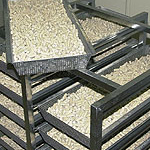Authorisation of genetically modified food and feed

The approval procedure as layed down in Regulation (EC) No. 1829/2003 on genetically modified food and feed requires a safety assessment by the European Food Safety Agency (EFSA).
An authorisation can only be granted for genetically modified food and feed which do not have adverse effects on human health, animal health or the environment and if consumers or users are not misled. Moreover, the genetically modified food and feed must not differ from the products which it is intended to replace to such an extent that its normal consumption would be nutritionally disadvantageous for consumers or animals. Genetically feed must not harm or mislead the consumer by impairing the distinctive features of the animal products.
The safety assessment of food and feed derived from genetically modified organisms (GMOs) is based on the comparison of the GMO in question with its conventional comparatort. This comprises the molecular characterisation of the genetic modification and the resulting new protein(s) as well as a comparative analysis of the nutritients, and anti-nutrients as well as endogenous toxins and allergens that are of relevance for the specific organism. This permits a conclusion of whether the genetic modification may have causedany unintended changes. If changes in content of coumpounds are found, a decision is to be made depending on the type and scope of differences which further testing is necessary in order to provide evidence that the GMO derived products are as safe as their conventional counterparts.
Authorisation procedure for genetically modified food and feed
Authorisations for the placing on the market of genetically modified food and feed are granted by the European Commission.
It is the task of EFSA to examine, on the basis of the documents enclosed with the application, whether the product corresponds to the requirements in terms of placing on the market and labelling.
Taking into account the opinion of EFSA, the European Commission prepares a draft decision; for it to be approved it requires a qualified majority of the Member States.
The competent authorities of the EU Member States are provided with the applications and can provide EFSA with their opinion on the n the safety assessment. In accordance with article 1, para1 4, number 4 of the German law implementing the EC Regulations on Genetic Engineering, the German competent authority for providing EFSA with national comments is the Federal Office of Consumer Protection and Food Safety (BVL).The comments are elaborated in consultation with the Federal Office for Nature Conservation (BfN) and the Robert Koch Institute (RKI). In addition, the BVL requests statements from the German Federal Institute for Risk Assessment (BfR) and the Julius Kühn Institute (JKI).
Labelling requirements for genetically modified food and feed
Regulation (EC) No. 1829/2003 requires specific labelling in order to inform consumers about any characteristic or property which renders a genetically modified food or feed different from its conventional counterpart with respect to
- composition, nutritional value or properties and nutritional effects, intended use;
- implications for the health of certain sections of the population groups or certain species or categories of animals;
- ethical or religious concerns.
Moreover, it must also be evident from the label that the food or feed is genetically modified.
Irrespective of the detectability of the genetic modification, Regulation (EC) No. 1829/2003 requires labelling of all foods and feeds produced from GMO including those not containing any GMO derived material, such as refined oils produced from from GM oilseeds that are not distinguishable from conventional oil. The words "genetically modified" or "produced from genetically modified (e.g. corn)" shall appear on the label. Labelling is not required to foods and feeds containing GMO derived material in a proportion no higher than 0.9 per cent, provided that there is evidence that the presence of this material is adventitious or technically unavoidable due to traces of GMOs that might accidentally have entered the supply chain during cultivation, transport or processing.
Traceability
Regulation (EC) No. 1830/2003 provides a framework for the traceability of GMO derived food and feed with the objective of facilitating accurate labelling, monitoring the effects on the environment and, where appropriate, on health, and, if necessary, withdrawal of products. To this end, the Commission has adopted Regulation (EC) No. 65/2004, which lays down a system for the development and assignment of unique identifiers to all GMOs. The parties involved in placing such products on the market must establish systems and standardised procedures to ensure that the data on GMOs can be stored for a period of five years.
In addition to a labelling proposal, applications for authorisation must be accompanied by methods for the identification of the GMOs as well as reference material necessary for monitoring compliance with the labelling requirements and traceability provisions, which in Germany is performed by the competent authorities of the federal states.
The testing and evaluation of the detection methods is within the remit of the Joint Research Centre of the EU Commission (JRC), who established a European Network of GMO Laboratories (ENGL) for this purpose back in December 2002. The German Federal Institute for Risk Assessment (BfR), whose staff began with the development of detection methods for genetically modified even earlier in 1995, is one of the founding members of this network.
The international standardisation of methods for the detection of genetically modified foods and for the quantification of the GMO derived material is performed by working groups of the German and European standardisation institutes DIN and CEN under the lead and with participation of BfR scientists.
